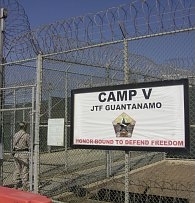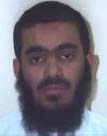Sadik Ahmad Turkistani is an ethnic Uyghur born and raised in Taif, Saudi Arabia and an opponent of the Taliban. Held by the Taliban in Kandahar prison in Afghanistan, he was briefly freed when they were overthrown in late 2001.

The Guantanamo Bay detention camp is a United States military prison located within Guantanamo Bay Naval Base, also referred to as Guantánamo, GTMO, and Gitmo, on the coast of Guantánamo Bay in Cuba. Of the 780 people detained there since January 2002 when the military prison first opened after the September 11, 2001 attacks, 731 have been transferred elsewhere, 39 remain there, and 9 have died while in custody.
Mishal Awad Sayaf Alhabiri is a citizen of Saudi Arabia, who was held in extrajudicial detention in the United States Guantanamo Bay detention camps, in Cuba. His Guantanamo Internment Serial Number was 207. American intelligence analysts estimate he was born in 1980, in Minawara, Saudi Arabia.

Jabir Jubran Al Fayfi is a citizen of Saudi Arabia who was held in extrajudicial detention in the United States Guantánamo Bay detention camp, in Cuba on allegations he trained and fought with al-Qaeda and the Taliban in Afghanistan in 2001.

Mohamed Atiq Awayd Al Harbi is a citizen of Saudi Arabia formerly held in extrajudicial detention in the United States's Guantanamo Bay detention camps, in Cuba. His Guantanamo Internee Security Number was 333. The US Department of Defense reports that he was born on July 13, 1973, in Riyadh, Saudi Arabia.
Sami Abdul Aziz Salim Allaithy Alkinani is a citizen of Egypt who was held in the United States Guantanamo Bay detention camps, in Cuba. His Guantanamo Internment Serial Number was 287. Joint Task Force Guantanamo counter-terrorism analysts reported that he was born on October 28, 1956, in Shubrakass Egypt.

Yussef Mohammed Mubarak al-Shihri (1985–2009) was a citizen of Saudi Arabia who was held in extrajudicial detention in the United States's Guantanamo Bay detention camps, in Cuba. He was born on September 8, 1985, in Riyadh Saudi Arabia.
Umar Abdullah Al Kunduzi is a citizen of Afghanistan, who was held in extrajudicial detention in the United States Guantanamo Bay detention camps, in Cuba.
No Longer Enemy Combatant (NLEC) is a term used by the U.S. military for a group of 38 Guantanamo detainees whose Combatant Status Review Tribunal determined they were not "enemy combatants". None of the detainees who were determined not to have been enemy combatants were released right away. Ten of the detainees who had been determined not to have been enemy combatants were allowed to move to the more comfortable Camp Iguana. Others, such as Sami Al Laithi, remained in solitary confinement.
Turki Mash Awi Zayid Al Asiri was a citizen of Saudi Arabia who was held in extrajudicial detention in the United States's Guantanamo Bay detention camps, in Cuba. His Guantanamo Internment Serial Number was 185. Joint Task Force Guantanamo counter-terrorism analysts reports that Al Asiri was born on March 8, 1975, in Yaboq, Saudi Arabia.
The Center for Constitutional Rights has coordinated efforts by American lawyers to handle the habeas corpus, and other legal appeals, of several hundred of the Guantanamo detainees.
Nasir Maziyad Abdallah Al Qurayshi Al Subii is a citizen of Saudi Arabia who was held in extrajudicial detention in the United States Guantanamo Bay detention camps, in Cuba. His Guantanamo Internment Serial Number was 497. American counter-terror analysts estimate he was born in 1983, in Al Arib, Saudi Arabia.

Semiannually, the Office of the Director of National Intelligence (ODNI) publishes an unclassified “Summary of the Reengagement of Detainees Formerly Held at Guantanamo Bay, Cuba”. According to ODNI’s most recent Reengagement Report, since 2009, when current rules and processes governing transfer of detainees out of Guantanamo were put in place, ODNI assess that 5.1% of detainees – 10 men total, 2 of whom are deceased – are more likely than not to have reengaged in terrorist activities.
Khalid Sulaymanjaydh Al Hubayshi is a citizen of Saudi Arabia who was held in extrajudicial detention in the United States Guantanamo Bay detention camps, in Cuba. Al Hubayshi, who acknowledged some jihadists' activity, spent three years in Guantanamo, a further years in Saudi Arabia's al-Ha'ir Prison, prior to graduating from the Saudi jihadist rehabilitation program. Several western journalists have interviewed him, and accepted that he appears to have successfully reintegrated into the mainstream of Saudi society.
Jill M. Friedman is an American lawyer. She is known for her legal work pertaining to the prisoners of Guantanamo Bay. Friedman is a member of the Washington office of Weil, Gotshal & Manges, a law firm that provided free representation for five Saudis detained at Guantanamo Bay. Friedman and Anant Raut wrote "The Saudi Repatriates Report," released in May 2007. The report is a statistical analysis of the cases of 24 repatriated Saudis, a group representing nearly half of the 53 Saudi nationals who had then been released from Guantanamo Bay.

Mish'al Muhammad Rashid Al-Shedocky was a citizen of Saudi Arabia who was held in extrajudicial detention in the United States's Guantanamo Bay detention camps, in Cuba. His Guantanamo Internment Serial Number was 71.
In late 2008, the Department of Defense published a list of the Guantanamo captives who died in custody, were freed, or were repatriated to the custody of another country. The list was drafted on October 8, 2008, and was published on November 26, 2008. Subsequently almost two hundred more captives have been released or transferred, and several more have died in custody.




